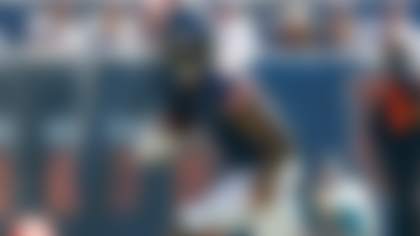Super Bowl LV's in the books, bringing an unprecedented NFL season to a close. So, how did the new guys perform in this uniquely challenging 269-game slate? Gennaro Filice and Nick Shook are taking a division-by-division look at each team's rookie class, providing grades and analysis on Year 1 production. Shook examines the NFC South below.
Round 1
- (No. 13) Tristan Wirfs, OT, 16 starts
Round 2
- (45) Antoine Winfield Jr., S, 16 starts
Round 3
- (76) Ke'Shawn Vaughn, RB, 10 games
Round 5
- (161) Tyler Johnson, WR, 14 games/3 starts
Round 6
- (194) Khalil Davis, DL, 2 games
Round 7
- (241) Chapelle Russell, LB, 11 games (now w/ JAX)
- (245) Raymond Calais, RB, 4 games (w/ LAR)
The Buccaneers nailed their first-round pick, making Wirfs the fourth tackle taken in the opening round and ending up with the best of the rookie class. Wirfs made the PFWA All-Rookie Team after starting all 16 games and grading out as one of the top eight tackles in the entire NFL, per Pro Football Focus. The Buccaneers needed a rock-solid right tackle after letting Demar Dotson walk in free agency and found their man in Wirfs. Winfield was another stud for Tampa Bay, starting all 16 games and showing up against the ground game, recording the third-best run defense grade among safeties. He can improve in coverage, but compiled a very promising first NFL season. Vaughn got lost in a crowded running back room that also included Ronald Jones, Leonard Fournette and LeSean McCoy, but if he can hang around long enough, he might be able to prove he was worth the pick. Johnson was another youngster who was buried by more senior teammates at his position, but when Antonio Brown exited in the Divisional Round, Johnson stepped up to make a timely catch on a key possession in the Buccaneers' upset win at New Orleans. Johnson looks like he might prove to be a great value pick as time progresses and the Bucs need to look down their depth chart for contributors, as he displayed upside in his small windows of opportunity. Davis didn't see much playing time, but did receive 18 defensive snaps in Tampa Bay's wild-card win over Washington. Russell played a handful of special teams snaps after a midseason promotion from the practice squad, and was eventually waived, landing with Jacksonville in early January. Calais was a cutdown-day casualty, ending up on the Buccaneers' practice squad for four days before the Rams signed him.
Round 1
- (No. 7) Derrick Brown, DT, 16 games/15 starts
Round 2
- (38) Yetur Gross-Matos, DE, 12 games/7 starts
- (64) Jeremy Chinn, S, 15 starts
Round 4
- (113) Troy Pride, CB, 14 games/8 starts
Round 5
- (152) Kenny Robinson, S, 9 games
Round 6
- (184) Bravvion Roy, DT, 15 games/9 starts
Round 7
- (221) Stantley Thomas-Oliver, CB, 10 games
Notable Undrafted Free Agents
- Joseph Charlton, P, 16 games
- Sam Franklin, S, 14 games/4 starts
- Myles Hartsfield, DB/RB, 16 games
- Rodney Smith, RB, 7 games/1 start
Brown had a solid first season at a position that traditionally lacks glamour, recording 34 tackles (eight for loss) and two sacks. He finished among the likes of Chase Young and Ndamukong Suh with 11 stuffs (tackles made on run plays resulting in no gain or loss), recorded 26 stops (tackles that result in a successful play for the defense based on the yards to go by down) and collected 19 disruptions (the combined total of hurries, pressures and sacks, with only one counting per play), leaving room for improvement in Year 2 and beyond. Gross-Matos adjusted after a slow start to the season, finishing with three sacks, 17 stops and 22 disruptions, including a turnover caused by a pressure. Chinn had an outside shot at winning Defensive Rookie of the Year and was all over the field for the Panthers, finishing with the most tackles among all NFL rookies with 116. He wasn't a consistent force in every single game, but his high points were encouraging, as evidenced by his back-to-back scoop-and-score touchdowns in Week 12 and consecutive NFL Defensive Rookie of the Month awards. He landed on the PFWA All-Rookie Team alongside Brown. Pride looked like a pretty typical fourth-round pick, needing more time to adjust to the pro game and develop. Similar story with Thomas-Oliver, who saw slightly more time on special teams than he did on defense and isn't yet reliable as a starting defensive back. Robinson played special teams almost exclusively. Roy found much more success as a pass rusher than against the run, and though he started nine games, he's currently more of a rotational defender. Hartsfield started the season as a special teamer with a defensive background, but filled in at running back in a place of need before ending up back as an exclusive player in the third phase of the game, finishing with 13 tackles and two fumble recoveries. Charlton ended up taking over for Michael Palardy, playing in all 16 games and finishing in the upper half of the league in net punting average. Smith scored a touchdown while receiving limited touches and could stand as a replacement for the role behind Christian McCaffrey. Franklin came up with a few key plays and played a healthy amount of defensive snaps, earning a PFF grade of 55 overall.
Round 1
- (No. 16) A.J. Terrell, CB, 14 starts
Round 2
- (47) Marlon Davidson, DT, 8 games
Round 3
- (78) Matt Hennessy, C, 13 games/2 starts
Round 4
- (119) Mykal Walker, LB, 16 games/6 starts
- (134) Jaylinn Hawkins, S, 12 games/2 starts
Round 7
- (228) Sterling Hofrichter, P, 16 games
Terrell's stat line -- 74 tackles, seven passes defensed, three forced fumbles, one interception (and nearly two) -- is promising. The upside with Terrell is visible; he just needs more time to hone his craft and become an effective professional corner. Davidson didn't quite play enough to give us a true sample size for a complete evaluation, appearing in just eight games and playing 132 total defensive snaps. While spending most of his time at center, Hennessy also played a third of his snaps at guard and wasn't up to par as a rookie (especially in pass blocking), but that's not all that uncommon for a middle-round interior lineman. Walker carries this class, earning an overall grade of 74 from PFF and an elite coverage grade of 90.7 as a rookie, giving the Falcons solid value from a fourth-round pick. He didn't play anywhere near a full season's worth of defensive snaps in 2020, but that's bound to change in 2021. Hawkins ended up spending most of his time on special teams, though he did register a half-sack in Atlanta's blowout win over Las Vegas. Hofrichter appeared in all 16 games and dropped 17 punts inside the opposing 20, but landed near the bottom of the league in average yards per punt.
Round 1
- (No. 24) Cesar Ruiz, OG, 15 games/9 starts
Round 3
- (74) Zack Baun, LB, 15 games/3 starts
- (105) Adam Trautman, TE, 15 games/6 starts
Round 7
- (240) Tommy Stevens, QB/TE, 1 game (w/ CAR)
Notable Undrafted Free Agent
- Marquez Callaway, WR, 11 games/3 starts
There's not a lot to choose from here, but the Saints did a good job of answering a looming question on the interior of their offensive line by spending their first-round pick on Ruiz. He needs to improve in pass blocking, but he'll certainly be a starter going forward, especially after the Saints released Nick Easton. Baun didn't see a ton of playing time, but embodies a theme that should emerge from this class: New Orleans picked this group for the future. Baun might step into a larger role next season with departures at the linebacker position. Trautman caught 15 passes in limited duty and could replace Jared Cook in 2021. Callaway chipped in with 21 catches for 213 yards on just 267 snaps. Stevens was moved from quarterback to tight end, and eventually ended up in Carolina, where he's again considered a quarterback.
Follow Nick Shook on Twitter.
















